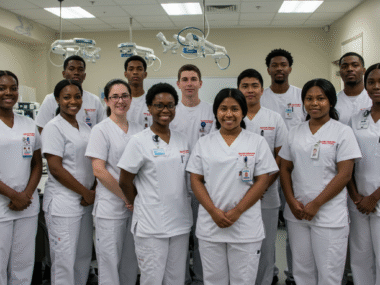The diploma in your hand is no longer a golden ticket to a lifelong career; it is merely the starting line of a marathon you will be running for the rest of your professional life. We are living through one of the most transformative periods in human history. The world your parents entered after graduation is vastly different from the one that awaits you. Automation, artificial intelligence, and globalization are not just buzzwords from a tech conference; they are powerful forces reshaping industries, creating new jobs, and making others obsolete overnight. In this dynamic, unpredictable landscape, the skills that once guaranteed success are becoming table stakes. To not just survive but truly thrive, students today need to cultivate a new toolkit—a blend of technical knowledge, timeless human abilities, and deep personal resilience.
This guide is not about predicting the exact jobs of 2040. It is about building a foundation of skills so robust, so adaptable, that you can pivot, innovate, and lead no matter what the future throws at you. It is about shifting your mindset from “learning to get a job” to “learning how to create value” for the rest of your life. We will explore the essential technical skills that form the new literacy, the irreplaceable human skills that machines cannot replicate, and the personal development skills that will make you resilient, adaptable, and ultimately, successful in the decades to come.
Recommendations:
- Machine Learning Engineer: Future Career in 2025
- Top Online Platforms for Free Certifications
- How Virtual Classrooms Help Students Stay Ahead
The Shifting Landscape: Why ‘Future Skills’ Matter More Than Ever
Before we dive into the specific skills, it is crucial to understand the ‘why.’ Why is this conversation so urgent? Why can you no longer rely on a traditional curriculum alone? The ground is shifting beneath our feet, driven by several major global trends.
The Rise of the Fourth Industrial Revolution
You have likely heard the term, but what does it really mean for you? The Fourth Industrial Revolution is characterized by the fusion of the physical, digital, and biological worlds. It is the era of Artificial Intelligence (AI), the Internet of Things (IoT), robotics, 3D printing, and quantum computing.
Unlike previous industrial revolutions that changed how we worked with our hands, this one is changing how we think and make decisions. AI and automation are beginning to handle routine cognitive tasks—the very work that many white-collar jobs were built on. Data analysis, report generation, and even some forms of legal research can now be done faster and more accurately by algorithms. This does not mean robots are taking all the jobs. It means the jobs that remain will require skills that complement these technologies: creativity to ask the right questions, critical thinking to interpret the AI’s output, and ethical judgment to deploy technology responsibly.
The Gig Economy and the Portfolio Career
The idea of working for one company for 40 years and retiring with a gold watch is a relic of the past. The gig economy, freelance work, and short-term contracts are becoming increasingly common. This leads to the concept of a “portfolio career,” where your career is not a single, linear path but a collection of different projects, roles, and experiences.
This new reality demands a different set of skills. You need to be your own manager, marketer, and financial planner. You need to be ableto network effectively, build a personal brand, and continuously pitch your value to potential clients or employers. This entrepreneurial mindset is no longer just for those who want to start a business; it is a survival skill for navigating a flexible and often uncertain job market.
Globalization and Cross-Cultural Collaboration
The world is more interconnected than ever. Your future team will likely not be in the same building, or even the same country. You might collaborate on a project with a developer in India, a designer in Brazil, and a marketer in Kenya, all without ever meeting in person.
This requires a high level of cultural intelligence and communication skills. You need to understand different cultural norms, communication styles, and work ethics. You need to be proficient with the digital tools that facilitate remote collaboration and be able to build trust and rapport with people across a screen. Empathy and the ability to see things from multiple perspectives are no longer soft skills; they are essential for global business.
The Shrinking Half-Life of Skills
Perhaps the most critical driver is the speed at which knowledge becomes outdated. It is estimated that the “half-life” of a technical skill is now just a few years. This means that half of what you learn about a specific technology or software today will be irrelevant in a short time.
The frightening conclusion is this: you cannot possibly learn everything you need to know for your entire career while you are in school. The goal of education must shift from knowledge transfer to knowledge creation. The most valuable skill of all is learning how to learn. You must become a proactive, lifelong learner, driven by curiosity and the discipline to constantly update your own mental software.
Foundational ‘Hard’ Skills: The New Technical Toolkit
In a world powered by technology, a certain level of technical proficiency is non-negotiable. However, it is not just about becoming a coder or an engineer. It is about understanding the language and logic of the digital world so you can be a creator, not just a consumer, of technology.
1. Digital Literacy and Fluency
This is the bedrock upon which all other technical skills are built. True digital literacy goes far beyond knowing how to use social media or write an email. It is the ability to effectively and ethically find, evaluate, use, and create information using digital technologies.
What it looks like in practice:
- Information Evaluation: Can you distinguish between a credible academic source and sophisticated misinformation? Do you know how to fact-check a claim or identify a phishing attempt?
- Digital Tools Proficiency: Are you adept with the tools of modern productivity and collaboration? This includes cloud-based suites (like Google Workspace or Microsoft 365), project management software (like Trello or Asana), and communication platforms (like Slack or Teams).
- Content Creation: Can you create and edit a simple video, design a compelling presentation, build a basic website, or manage a professional social media profile?
- Understanding Digital Citizenship: This involves understanding online etiquette, privacy issues, and the ethical implications of your digital footprint.
How to develop it: Treat every project as an opportunity to master a new digital tool. Start a personal blog to practice content creation. Take online courses on digital safety and information verification. Challenge yourself to move beyond passive consumption and become an active, critical creator in the digital space.
2. Data Literacy: The New Universal Language
Data is often called the new oil, but that analogy is incomplete. Oil is a finite resource that is consumed. Data is an infinite resource that generates more value the more it is used. In the future, every field—from marketing and finance to healthcare and education—will be driven by data. Being data-literate means you can read, work with, analyze, and argue with data.
Why it matters for everyone:
- A marketer needs to analyze campaign metrics to understand customer behavior.
- A doctor needs to interpret data from medical studies and patient records to make better diagnoses.
- A teacher needs to look at student performance data to personalize learning.
- A city planner needs to use demographic and traffic data to design better urban spaces.
Key components of data literacy:
- Data Interpretation: The ability to look at a chart, graph, or spreadsheet and understand what it is telling you.
- Data Visualization: Understanding the principles of how to present data in a clear, compelling, and honest way.
- Basic Statistical Concepts: You do not need to be a statistician, but you should understand concepts like correlation versus causation, mean, median, and statistical significance.
- Asking the Right Questions: The most important data skill is knowing what questions to ask of the data to uncover meaningful insights.
How to develop it: Start by paying attention to the data around you in the news and online. Question how it is presented. Take an introductory online course in data analytics or statistics. Learn the basics of a tool like Microsoft Excel or Google Sheets, focusing on pivot tables and basic charting. The goal is not to become a data scientist but to become a confident and critical consumer and user of data in your chosen field.
3. Understanding AI and Machine Learning
Artificial Intelligence is arguably the most powerful technology of our time. You do not need to know how to build a complex neural network, but you absolutely need to understand the fundamental concepts of what AI and machine learning are, what they can do, and their limitations. This knowledge is essential for working alongside AI-powered tools and for making informed decisions as a citizen.
What you need to understand:
- The Difference: Know the distinction between general AI (the stuff of science fiction) and narrow AI (the technology that powers things like recommendation engines and voice assistants today).
- How it Learns: Have a conceptual grasp of machine learning—the idea that systems can learn from data, identify patterns, and make decisions with minimal human intervention.
- The Problem of Bias: Understand that AI systems are trained on data created by humans, and they can inherit and even amplify human biases related to race, gender, and other factors.
- Ethical Implications: Be prepared to engage in conversations about the ethical use of AI in areas like surveillance, autonomous weapons, and job displacement.
How to develop it: Watch introductory videos and documentaries about AI. Follow thought leaders in the AI space online. Use and critically examine the AI tools you interact with every day, from Netflix recommendations to Google search results. Ask yourself: What data is this using? What biases might be at play here?
4. Coding and Computational Thinking
Many people hear “coding” and immediately think it is not for them. But learning to code is less about becoming a professional software developer and more about learning a new way to think. Computational thinking is the process of breaking down a complex problem into smaller, more manageable parts that a computer (or a human) can execute. It is a powerful problem-solving framework.
Why it is a valuable skill for any field:
- It teaches you logic, sequencing, and how to troubleshoot problems systematically.
- It allows you to automate repetitive tasks, freeing you up for more creative work.
- It gives you a better understanding of the digital tools you use every day, making you a more empowered user.
- Even a basic understanding of a language like Python can open up huge possibilities for data analysis, while knowledge of HTML/CSS can help you in marketing or content creation.
How to get started: You do not need to enroll in a four-year computer science degree. There are countless free and low-cost resources online like Codecademy, freeCodeCamp, and Khan Academy. Start with a beginner-friendly language like Python for its versatility or HTML/CSS for understanding the structure of the web. The goal is literacy, not mastery.
5. Cybersecurity Awareness
In a world where our personal, financial, and professional lives are stored online, cybersecurity is no longer an IT department issue—it is a life skill. A single data breach can have devastating consequences. Understanding the basics of how to protect yourself and your information is as fundamental as knowing how to lock your front door.
Essential knowledge for every student:
- Strong Password Hygiene: Understanding how to create, manage, and protect strong, unique passwords, and the importance of two-factor authentication (2FA).
- Phishing and Social Engineering: The ability to recognize malicious emails, messages, and websites designed to trick you into revealing sensitive information.
- Data Privacy: Being conscious of the data you share online, understanding the privacy settings on your social media accounts, and knowing your rights regarding your personal information.
- Secure Networks: Recognizing the difference between a secure and an unsecured Wi-Fi network and the risks of using public networks for sensitive transactions.
How to develop it: Be skeptical. Before clicking a link or downloading an attachment, pause and think. Use a password manager to help create and store complex passwords. Regularly review the privacy settings on your accounts. Stay informed about common scams and security threats by following reputable tech news sources.
Enduring ‘Soft’ Skills: The Human Advantage
As technology automates more routine technical and cognitive tasks, the skills that will become most valuable are those that are uniquely human. These are the abilities that machines struggle to replicate: understanding context, navigating social dynamics, and generating novel ideas. These are not “soft” in the sense of being easy; they are hard to develop and even harder to measure, but they will be your greatest asset.
6. Critical Thinking and Complex Problem-Solving
This is the king of all human skills. Critical thinking is not about being negative or critical of others. It is the disciplined process of actively and skillfully conceptualizing, applying, analyzing, synthesizing, and evaluating information to guide belief and action. In a world saturated with information, misinformation, and opinions disguised as facts, the ability to think clearly and rationally is your superpower.
Critical thinking in action:
- Asking Probing Questions: Instead of accepting information at face value, you ask: Who said this? What is their evidence? What are their assumptions? Are there alternative explanations?
- Identifying Biases: This includes recognizing your own cognitive biases (like confirmation bias) and identifying the biases in sources of information.
- Root Cause Analysis: When faced with a problem, you do not just treat the symptoms. You dig deeper to find the underlying cause. A useful technique is the “5 Whys,” where you repeatedly ask “Why?” to get to the core of an issue.
- Making Evidence-Based Decisions: You base your conclusions on data and logical reasoning, not on emotion or anecdotal evidence.
How to practice it: Actively seek out different perspectives on an issue. Read articles or books that challenge your current beliefs. Join a debate club. When working on a group project, take on the role of the person who questions assumptions. Before sharing an article online, take five minutes to verify its source and main claims.
7. Creativity and Innovation
In a world where AI can produce technically perfect work, creativity is what will set you apart. Creativity is not just for artists and musicians. It is the ability to connect seemingly disparate ideas to generate something new and valuable. It is about seeing problems as opportunities and finding novel solutions.
Dispelling the myths of creativity:
- Myth 1: You are either born creative or you are not. Reality: Creativity is a skill that can be developed through practice, just like any other.
- Myth 2: Creativity is about a single “eureka” moment. Reality: Innovation is usually the result of a long process of trial and error, iteration, and building on the ideas of others.
How to foster your creativity:
- Cultivate Curiosity: Read widely outside of your major. Watch documentaries on subjects you know nothing about. Ask “What if?” questions constantly.
- Embrace Boredom: Constant stimulation from our phones can kill creativity. Allow your mind time to wander, as this is often when new connections are made.
- Practice Brainstorming: When tackling a problem, use techniques like mind mapping to generate a large quantity of ideas without judgment. The goal is quantity over quality in the initial phase.
- Seek Diverse Inputs: Collaborate with people from different backgrounds and disciplines. Travel. Expose yourself to new art, music, and food. The more diverse your inputs, the more original your outputs will be.
8. Communication and Storytelling
You can have the most brilliant idea in the world, but if you cannot communicate it clearly, concisely, and persuasively, it is worthless. Effective communication is about more than just good grammar. It is about understanding your audience, structuring your message for maximum impact, and connecting with people on an emotional level.
The key pillars of modern communication:
- Clarity and Brevity: In a world of information overload, the ability to get to the point quickly is a prized skill. Learn to edit your own writing ruthlessly. Practice explaining a complex idea in simple terms.
- Active Listening: Great communication is a two-way street. Active listening means paying full attention to what others are saying, asking clarifying questions, and demonstrating that you understand their perspective before you respond.
- Digital Communication Etiquette: Understand the nuances of different platforms. A professional email has a different tone and structure than a message on a team chat app.
- Storytelling: Humans are wired for stories. Whether you are in a job interview, pitching an idea, or writing a report, framing your message as a story—with a clear beginning, a challenge, and a resolution—makes it more memorable and persuasive.
How to improve your communication skills: Join a public speaking club like Toastmasters. Start a blog or a podcast to practice structuring your thoughts. When you send an important email, read it aloud to check for clarity and tone. Pay attention to how great speakers and writers structure their arguments.
9. Collaboration and Teamwork
The “lone genius” is a myth. Nearly all significant achievements, from scientific breakthroughs to successful businesses, are the result of effective teamwork. The future of work is collaborative, often involving diverse, geographically distributed teams. Being a great team player is not just about being nice; it is about making the group more effective than the sum of its parts.
What makes a great collaborator:
- Reliability: You do what you say you will do, on time and to a high standard.
- Constructive Feedback: You can give and receive feedback graciously, focusing on the work, not the person.
- Flexibility: You are willing to adapt your ideas and approach based on the input of others.
- Empathy: You make an effort to understand the perspectives and challenges of your teammates.
- Conflict Resolution: You do not shy away from disagreements but approach them as opportunities to find a better solution, rather than as personal battles.
How to practice collaboration: Seize every opportunity for group projects in school. When conflicts arise, focus on resolving them constructively instead of letting them fester. Use project management tools to keep everyone on the same page. Actively solicit input from quieter members of the team. Reflect after each project: What went well? What could our team do better next time?
10. Emotional Intelligence (EQ)
Emotional intelligence is the ability to understand and manage your own emotions, and to recognize and influence the emotions of others. In many professional contexts, EQ is a more powerful predictor of success than IQ. As AI handles more of the analytical work, our ability to lead, persuade, empathize, and inspire will become our primary value.
The core components of EQ:
- Self-Awareness: Understanding your own emotions, strengths, weaknesses, and what motivates you.
- Self-Regulation: The ability to control or redirect disruptive impulses and moods. It is about thinking before you act.
- Motivation: A passion for work for reasons that go beyond money or status, and a propensity to pursue goals with energy and persistence.
- Empathy: The ability to understand the emotional makeup of other people. It is the fundamental skill for effective teamwork and leadership.
- Social Skill: Proficiency in managing relationships and building networks.
How to develop your EQ: Practice mindfulness or meditation to become more aware of your emotional state. When you feel a strong emotion, pause and name it before you react. Actively practice seeing situations from other people’s perspectives. Seek feedback from trusted friends or mentors on how you come across to others.
Personal Growth Skills: Building a Resilient Self
The final category of skills is perhaps the most personal, but it is the foundation that supports everything else. The future will be characterized by constant change and uncertainty. Without a strong inner core of resilience, adaptability, and a commitment to growth, even the most technically proficient person will struggle.
11. Adaptability and Resilience
Change is the only constant. Industries will be disrupted, companies will pivot, and job roles will evolve. Adaptability is your ability to adjust to new conditions. Resilience is your ability to bounce back from adversity and failure. Together, they form your capacity to thrive in a turbulent world.
The key is developing a “growth mindset,” a concept popularized by psychologist Carol Dweck.
- Fixed Mindset: Believes intelligence and talent are fixed traits. Avoids challenges to avoid failure.
- Growth Mindset: Believes abilities can be developed through dedication and hard work. Sees failure not as a lack of ability but as a learning opportunity.
How to build adaptability and resilience:
- Step Outside Your Comfort Zone: Intentionally take on challenges that stretch your abilities. This could be a difficult course, a public speaking role, or learning a new skill.
- Reframe Failure: When you experience a setback, do not see it as a reflection of your worth. Instead, ask: “What can I learn from this? What will I do differently next time?”
- Focus on Process, Not Just Outcome: Celebrate the effort, strategy, and progress you make, not just the final grade or result.
- Build a Support Network: Cultivate strong relationships with friends, family, and mentors who can support you through difficult times.
12. Lifelong Learning and Curiosity
As we have established, your education does not end with graduation. The commitment to being a lifelong learner is the single most important skill for a long and successful career. This is not about passively consuming information; it is an active, self-directed pursuit of knowledge and skills, driven by your own curiosity.
Becoming a lifelong learner:
- Learn How to Learn: This is a “meta-skill.” Understand your own learning style. Learn techniques for effective reading, note-taking, and memory retention.
- Build a Learning Habit: Set aside dedicated time each week for learning, whether it is reading a book, taking an online course, or watching an educational video.
- Follow Your Curiosity: Do not limit your learning to what is required for your job. Explore topics that genuinely interest you. This cross-pollination of ideas is often where innovation happens.
- Utilize Modern Learning Platforms: Get familiar with platforms like Coursera, edX, LinkedIn Learning, and Khan Academy. They offer access to world-class education on virtually any topic.
13. Financial Literacy
This is a critical life skill that is tragically under-taught in formal education. You can have a fantastic career, but if you do not know how to manage your money, you will never achieve true financial freedom and security. Understanding the fundamentals of personal finance reduces stress and opens up opportunities.
The essential pillars of financial literacy:
- Budgeting and Saving: Understanding where your money is going and creating a plan to spend less than you earn.
- Understanding Debt: Knowing the difference between good debt (like a sensible student loan or a mortgage) and bad debt (like high-interest credit card debt), and how to manage it responsibly.
- The Basics of Investing: You do not need to be a stock market expert, but you should understand the power of compound interest and the basics of investing for long-term goals like retirement.
- Protecting Your Finances: Understanding insurance, credit scores, and how to protect yourself from identity theft and scams.
How to learn about it: Read books and follow reputable blogs and podcasts on personal finance. Use a budgeting app to track your spending. Start small by opening a savings or investment account, even with a tiny amount of money. The most important thing is to start building good habits early.
14. Personal Branding and Networking
In a connected world, you have a personal brand whether you cultivate it or not. It is what people say about you when you are not in the room. Proactively managing your personal brand means consciously shaping how you are perceived by others, especially online. Networking is the process of building genuine, mutually beneficial relationships that support your career.
Modern branding and networking:
- Curate Your Digital Footprint: Google yourself. What comes up? Ensure your public social media profiles present a professional and authentic image.
- Use LinkedIn Effectively: Your LinkedIn profile is your professional storefront. It should be complete, up-to-date, and showcase your skills and experiences.
- Provide Value First: Good networking is not about collecting contacts; it is about building relationships. Think about how you can help others before you ask for anything. Share useful articles, make introductions, or offer your skills.
- Quality over Quantity: A few strong, genuine connections are far more valuable than hundreds of superficial ones.
How to start: Create a professional LinkedIn profile. Follow and engage with people and companies in fields that interest you. Attend industry events (even virtual ones) and aim to have a few meaningful conversations. Reach out to alumni from your school for informational interviews to learn about their career paths.
15. The Entrepreneurial Mindset
Finally, regardless of whether you ever want to start your own company, you need to cultivate an entrepreneurial mindset. This is a way of thinking and acting that focuses on seeing opportunities, taking initiative, and creating value. It is about being a problem-solver, not just an employee who waits for instructions.
Traits of an entrepreneurial mindset:
- Proactive and Self-Directed: You do not wait to be told what to do. You identify problems or opportunities and take the first step to address them.
- Resourcefulness: You are skilled at finding creative ways to get things done, even with limited resources.
- Customer-Centric: You are always thinking about who you are serving (whether it is an external customer or an internal colleague) and how you can better meet their needs.
- Comfort with Ambiguity: You can move forward and make decisions even when you do not have all the information.
How to develop it: In any job, internship, or project, always ask: “How can this be done better?” Volunteer to lead a project. Start a small side project, even if it is just a blog or a small online shop. This forces you to learn about marketing, sales, and customer service firsthand. Treat every role you have as if you were the owner of that small part of the business.
Your Future Starts Now
The future of work may seem intimidating, but it is also filled with incredible opportunities for those who are prepared. The skills outlined here are not just a checklist to be completed; they are a new way of thinking, working, and living. They are interconnected and reinforce one another. Strong communication makes you a better collaborator. Creativity fuels your problem-solving. A growth mindset underpins your ability to be a lifelong learner.
Do not be overwhelmed. You do not need to master all of these overnight. The key is to start now. Pick one or two skills from this guide that resonate with you or feel like your biggest growth areas. Seek out opportunities to practice them in your classes, your part-time jobs, and your personal projects.
Your education is the foundation, but the construction of your future is up to you. By intentionally building this toolkit of future-proof skills, you are not just preparing for a job. You are preparing for a lifetime of meaningful work, continuous growth, and lasting success in a world of constant change. The journey starts with a single step. Take it today.
For Further Reading and Learning:
- Explore a vast range of courses on these topics and more on Coursera, a leading online learning platform that partners with top universities and companies.
- To understand the data behind the changing world of work, read the latest “Future of Jobs” report from the World Economic Forum.











